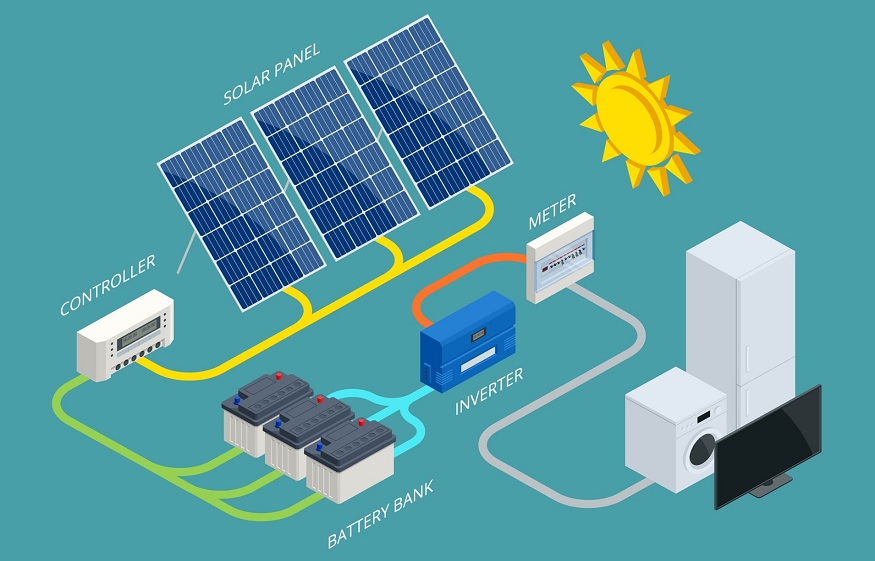Solar battery storage systems have gained popularity as a means to enhance the effectiveness of solar energy usage. Understanding the cost-effectiveness and benefits of these systems is crucial for potential buyers. In this article, we will explore the factors influencing the cost of solar battery storage systems and assess their overall value.
Are Solar Batteries Cost-Effective?
The cost of solar battery storage systems depends on various factors, including the battery’s chemical composition, lifespan, storage capacity, and usable capacity. In the UK, these systems typically range between €1,200 and €6,000 in cost.
Additionally, considering that the lifespan of a solar battery is 5 to 15 years, it may need replacement multiple times during the lifespan of your solar panels, which can increase the total cost of installing a complete solar panel system.
Despite these costs, having a home battery storage system can be worthwhile if you are not home during peak sunshine hours, as it allows you to store electricity for use when you are home after dark.
By becoming 100% energy-independent and self-reliant, you can reap the benefits of solar battery storage systems.
Why Do You Need a Solar Battery Storage System?
Pairing solar batteries with solar arrays provides several advantages:
Store energy for later use: Solar batteries store excess energy generated during daylight hours, making it available for use during non-production hours.
Significantly lower energy costs: By charging the battery during off-peak hours and discharging it during peak hours, you can reduce your reliance on expensive utility company electricity.
Earn money by selling stored energy: In some cases, you can sell the energy stored in your battery back to the electrical grid when prices are high, generating additional income.
Independence from the grid: Adding a solar panel battery to your system allows you to become independent from the national grid, ensuring energy security for your household.
When Is It Ideal to Install One?
A solar battery storage system is best used in combination with a solar PV array. If you already have an existing array, it is relatively easy to add a solar battery. If you don’t have either, you can purchase the two systems together to run your home entirely on renewable energy.
By making your solar panel array more efficient, the two technologies work together to reduce storage system costs. The cost of installation is often more economical when setting up your solar battery system alongside solar panels.
How Much Do Solar Batteries Cost?
Solar battery costs typically range between €1,200 and €6,000, depending on factors such as capacity, battery material, and lifespan. Lithium-ion batteries are the most cost-effective and commonly used due to their longer lifespan and higher usable capacity.
The table below provides estimated prices for different usable capacities of lithium-ion batteries:
Lithium-Ion Solar Battery Costs:
3 – 4 kWh: From €3,410
4 – 7 kWh: From €4,288
7 – 9 kWh: From €5,185
9 – 13.5 kWh: From €5,920
While lead-acid batteries may be initially cheaper, considering future replacement fees and shorter lifespans, lithium-ion batteries are a better long-term investment.
Are There Grants Available for Solar Batteries?
Although solar battery storage system costs may be high, there are ways to save money. In the UK, opportunities such as the Smart Export Guarantee (SEG) allow you to earn money by exporting stored electricity back to the grid.
Additionally, a VAT reduction is available for homeowners in England, Wales, and Scotland, allowing 0% VAT on energy-saving materials, including solar batteries installed alongside a solar panel system, until 2027.
The Home Energy Scotland Loan is also an option for Scottish residents, offering interest-free loans for energy-efficient improvements and renewable systems, including solar panels and batteries.
Types of Solar Batteries:
RV/Marine Solar Batteries: Suitable for smaller systems used in boats and RVs, best used when no other electricity source is available.
Flooded Type: Lead-acid batteries with caps for adding water, offering a good lifespan and lower cost compared to marine solar batteries.
Gel Batteries: Sealed gel batteries with no vents or gas release, suitable for indoor use and offering constant temperature and longer lifespan.
Absorbed Glass Mat (AGM) Batteries: Leakproof batteries with superior performance, maintaining voltage better, self-discharging slower, and lasting longer. They are the most expensive but of higher quality.
Pros and Cons of Solar Batteries:
Pros:
- Reducing utility bills by storing surplus electricity
- Flexibility to use electricity as needed
- Earning income by exporting stored energy
Cons:
- High upfront costs
- Battery replacement required after 5-15 years
- Limitations on exporting stored energy by some energy suppliers
The Lifespan of Solar Batteries:
The average lifespan of a solar battery storage system is 5 to 7.5 years for lead-acid batteries and 11-15 years for lithium-ion batteries. Proper care is necessary to prevent over-discharging and exposure to extreme weather conditions, as these can affect battery longevity.
Why Do You Need a Solar Battery Storage System?
Pairing solar batteries with solar arrays is a relatively new practice, but an effective one. You can benefit from solar battery storage in 4 key ways:
Store Energy for Later Use: A solar battery stores the energy generated during sunlight hours and makes it readily available for use during non-production hours, such as at night or on cloudy days. By making use of photovoltaics, you can essentially run your home on 100% renewable solar energy around the clock, as long as the electricity demand does not exceed the supply that the battery can provide.
Significantly Lower Energy Costs: Solar battery backup power can lower your energy costs significantly. By charging the solar battery during off-peak hours and discharging it during peak hours, you can avoid paying a lot for electricity from your utility company. The savings from this can help offset the cost of the battery system.
Earn Money by Selling Stored Energy: In some cases, you can even earn money by selling the energy stored in your solar battery back to the electrical grid when electricity prices are at their highest. This is possible if your energy provider accepts the export of stored energy. It can provide an additional source of income and further offset the costs of the system.
Become Independent from the Grid: By adding a solar panel battery to your solar system, you can choose to be independent from the national grid at any time, thereby ensuring energy security for your household. Naturally, the number of solar panels you need to install for this will vary depending on your energy demands and budget.
When Is It Ideal to Install One?
A solar battery storage system is best used in combination with a solar PV array. If you already have an existing array, it is relatively easy to add a solar battery into the mix. And if you have neither, you can purchase the two systems together to make your home run entirely on renewable energy.
The two technologies complement each other, making your solar panel array vastly more efficient and reducing storage system costs. If you have been considering going green, there is no better time to start taking advantage of the money you can save on your monthly electricity bill.
Solar battery storage systems offer a variety of battery types for you to choose from, each with its own advantages, such as more eco-friendly efficiency, longer lifespan, and easier installation. Whether you have an existing solar panel system or are starting from scratch, adding a solar battery can enhance the benefits of solar energy and provide greater energy independence.
How Much Do Solar Batteries Cost?
The cost of solar batteries can vary depending on several factors, including the capacity, chemical composition, and lifespan of the battery. Currently, the typical cost range for solar battery storage systems in the UK is between €1,200 and €6,000.
Lithium-ion batteries are the most popular and cost-effective option for solar panel systems. They have a longer lifespan and higher usable capacity compared to other battery materials. The estimated prices for lithium-ion batteries based on usable capacity are as follows:
3 – 4 kWh: Starting from €3,410
4 – 7 kWh: Starting from €4,288
7 – 9 kWh: Starting from €5,185
9 – 13.5 kWh: Starting from €5,920
Lead-acid batteries are another common option, typically cheaper in the short term but with a shorter lifespan and lower usable capacity. When considering the cost of lead-acid batteries, it’s important to consider future replacement fees. The initial cost may be lower, but the overall value may be better with lithium-ion batteries.
It’s important to note that as the adoption of solar battery storage systems becomes more widespread, their prices are expected to follow the declining trend seen in solar panel costs. So, while the initial investment may seem high, the long-term benefits and potential savings can make solar battery storage systems a worthwhile investment.
Are There Grants Available for Solar Batteries?
Although the cost of solar battery storage systems may not be moderate, there are opportunities to save money through grants and funding programs. In the UK, the Smart Export Guarantee (SEG) allows homeowners to earn money by exporting stored electricity back to the grid. Export tariffs vary with each energy supplier, but a good tariff range is typically between 4-6p/kWh.
Additionally, homeowners in England, Wales, and Scotland can take advantage of a VAT reduction on energy-saving materials, including solar batteries installed alongside a solar panel system. This reduction allows for a 0% VAT rate until 2027, providing further savings on the cost of installation.
In Scotland, the Home Energy Scotland Loan offers interest-free loans to finance energy-efficient improvements and renewable systems, including solar panels and solar batteries. The loan amount available for a solar battery storage system is up to €5,000, with a repayment period of 5-10 years, depending on the installation.
These grants and funding opportunities can help reduce the cost of installing a solar battery storage system and make it more accessible to homeowners.
Solar battery storage systems offer numerous benefits, such as energy independence, cost savings, and environmental sustainability. While the upfront costs may seem high, the long-term value and potential savings make them a worthwhile investment. By considering factors like battery type, capacity, and lifespan, as well as taking advantage of available grants and funding opportunities, homeowners can make informed decisions about installing solar battery storage systems.

